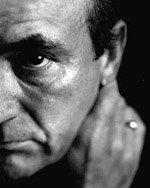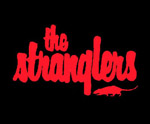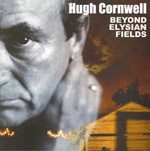Hugh Cornwell, The Strangler returns
The Strangler returns
 The man who rejected Chrissie Hynde as lead singer, gave lifts in his ice cream van to Elvis Costello and above all, co-wrote such anthems as ‘Golden Brown’, ‘No More Heroes’ and ‘Peaches’, is back. Hugh Cornwell, for years the face of The Stranglers, is hitting the charts again.
The man who rejected Chrissie Hynde as lead singer, gave lifts in his ice cream van to Elvis Costello and above all, co-wrote such anthems as ‘Golden Brown’, ‘No More Heroes’ and ‘Peaches’, is back. Hugh Cornwell, for years the face of The Stranglers, is hitting the charts again.
They say success the second time round is even sweeter, and judging by the contented look on Hugh Cornwell’s face it’s true. “Don’t get me wrong, I enjoyed every minute of my Stranglers years,” smiles Hugh, “but as I lived them to the full I can’t always remember that much about them.” Now things are different. The wild years are behind him and he’s grateful that he made it through them without so much as a migraine. Unlike many stars of the rock and punk era, he allowed himself to mellow, evolving both as a person and an artist rather than becoming an old rocker.
The result is Beyond Elysian Fields, released to the public in Spain on the 5th September and rated as his best work since the high-flying days of the Stranglers.
The turnaround
“It was the late eighties and the years of writing, recording and touring were starting to get to me. The seemingly endless cycle bore down on me and strained relations in the band. Being in a band is a bit like being in a marriage, and it’s not helped by living on top of each other for too much of the time. I would feel drained after gigs and didn’t have the same enthusiasm as before. Then it dawned on me; I could simply quit. The realisation, once it hit home, was quite liberating. A sense of loyalty to the band and the record company had kept me in place for a lot longer than was natural. I didn’t want to let everyone down, but it was time to move on.”
And so Hugh, one of the inspirations and founding members of The Stranglers, dropped the bombshell on his colleagues. “It isn’t easy to ‘break’ from a record company, but I managed to make a clean break and take some much-needed time off.” The band, meanwhile, continued, producing new music but still relying predominantly on material from the days when they were one of the leading lights of the punk movement.
A new direction
 For Hugh, the sudden change, huge though it was, suited him well. “I started to feel creative again, but as an individual I had the freedom to follow whatever direction I wanted to and wasn’t constrained by the interests of an established band.” A solo album followed, in which his huge cult following discovered a more introspective side to Hugh. “Art is art when it can evolve. Otherwise it’s not much more than production. I had started to experiment with new things, and while well aware that I had to prove myself all over again as an artist, I allowed myself freedom of expression.” Used to writing as a team with John Burnel, he adapted to the techniques required of a solo writer. “Bits of tunes and lyrics will suddenly pop into my head. I don’t write them down, I’ve trained myself to ‘store’ and recall them when I sit down to work on a piece.”
For Hugh, the sudden change, huge though it was, suited him well. “I started to feel creative again, but as an individual I had the freedom to follow whatever direction I wanted to and wasn’t constrained by the interests of an established band.” A solo album followed, in which his huge cult following discovered a more introspective side to Hugh. “Art is art when it can evolve. Otherwise it’s not much more than production. I had started to experiment with new things, and while well aware that I had to prove myself all over again as an artist, I allowed myself freedom of expression.” Used to writing as a team with John Burnel, he adapted to the techniques required of a solo writer. “Bits of tunes and lyrics will suddenly pop into my head. I don’t write them down, I’ve trained myself to ‘store’ and recall them when I sit down to work on a piece.”
His first post-Stranglers album, Wired, was launched to mixed reviews, but Hugh’s newfound creativity also found outlet in writing books, spawning ‘The Stranglers…Song by Song’, and his latest release, ‘A Multitude of Sins’. Although his publishers offered him a biographer, he found he enjoyed the writing process. Moreover, the publishers discovered he has a knack for it, and only needed to edit the text lightly. In ‘A Multitude of Sins’, Hugh takes us through his boyhood, his Stranglers years and his renaissance as a solo artist, but instead of using a chronological approach he does it episodically, describing the early years of the band, the sudden take-off and the sex, drugs and rock & roll that followed.
Wild times
“I have shady memories of much of the time, but they are good ones,” laughs the man whose punk star status opened the doors to a world of drugs and girls. Hugh immersed himself in it, but it was probably the fact that he had qualified as a biochemist before embarking on a professional musical career that helped him sort the good from the bad stuff, and reduce the negative effects. “I don’t regret taking drugs, it was a wild time and we were all doing it, but I certainly wouldn’t recommend it to anyone. It could all have turned out very different.” For many of the punk stars it did, of course, but then again, while bands such as the Sex Pistols represented the raw energy and angry rebelliousness of the movement, The Stranglers and the Talking Heads stood on the more intellectual side of the spectrum.
 “People have a lot to say about the punk movement, and it’s a great compliment if you’re associated with an era, like I do with Bob Dylan and Simon & Garfunkel, but I never thought I should try to speak for a generation. The word ‘punk’ was seized upon by the media and was a convenient way of grouping bands typified not so much by a single style but by their energy and uncomplicated music.” All the same, he found himself claimed by the movement and swept away by it. “It was bizarre, being the joint opening act with AC DC for The Who at Wembley. If I remember correctly, we had warmed the crowd up a little too well and the main act were not too pleased with us.” The Stranglers themselves had none other than U2 as their support act, and were frequently headlining huge events such as the Pink Pop Festival in Holland.
“People have a lot to say about the punk movement, and it’s a great compliment if you’re associated with an era, like I do with Bob Dylan and Simon & Garfunkel, but I never thought I should try to speak for a generation. The word ‘punk’ was seized upon by the media and was a convenient way of grouping bands typified not so much by a single style but by their energy and uncomplicated music.” All the same, he found himself claimed by the movement and swept away by it. “It was bizarre, being the joint opening act with AC DC for The Who at Wembley. If I remember correctly, we had warmed the crowd up a little too well and the main act were not too pleased with us.” The Stranglers themselves had none other than U2 as their support act, and were frequently headlining huge events such as the Pink Pop Festival in Holland.
Full circle
“I find it easier to perform in front of large crowds than small ones, where contact with the audience is more intimate and direct, so I greatly enjoyed doing Glastonbury for the first time last year. It was like old times.” Hugh has a fixed support band, consisting of a young solo guitarist and drummer. “As they are both 23, it’s hard work to keep up with them, so I work out and live healthy while on tour.”
A very important part of the recording process is editing, for which he joined forces again with Tony Visconti, who also produced the latest albums of David Bowie and Peter Gabriel. “It felt great to be working with Tony again, and the fact that we recorded in New Orleans, with its rich, mysterious atmosphere, obviously contributed to the tone of the album.” What does the future bring? “Lots of gigs and book readings in promotion of the album and the book respectively, with hopefully enough time to visit my beloved Costa de la Luz and above all, Cádiz, the source of much of my inspiration.” Beyond that, we’ll have to see, but for his army of devoted fans it is great to see the Strangler back in the limelight.










